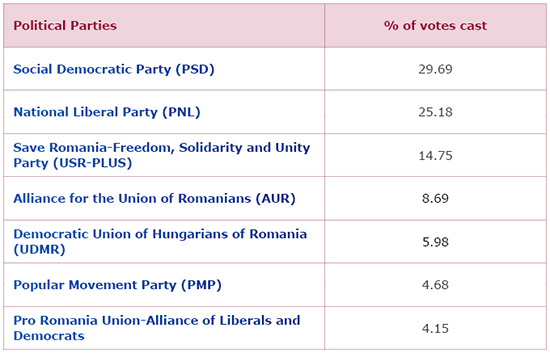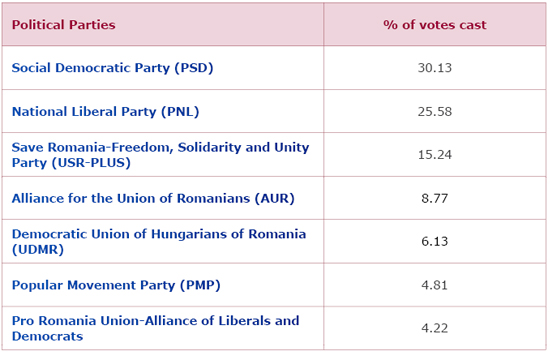Results
Elections in Europe
Corinne Deloy
-

Available versions :
EN

Corinne Deloy
The Social Democratic Party (PSD), led by Marcel Ciolacu, caused surprise in the parliamentary elections on 6th December in Romania since it came out ahead with 29.69% of the vote. It beat the National Liberal Party (PNL), led by outgoing Prime Minister Ludovic Orban, which won 25.18% of the vote. The 'Save Romania-Freedom, Solidarity and Unity Party', (USR-PLUS), the liberal movement led by Dan Barna, came third with 14.75% of the vote.
Only two other parties managed to clear the required 5% threshold (or 20% of the total votes cast in at least four constituencies) to be represented in the Camera deputatilor, the lower house of Parliament. These are the Alliance for the Union of Romanians (AUR), a nationalist party extremely close to the Orthodox Church led by George Simion and Claudiu Tarziu, with 8.69% of the vote, and which will make its entry into parliament, and the Democratic Union of Hungarians in Romania (UDMR), led by Hunor Kelemen, which won 5,98% of the vote.
On the other hand, the People's Movement Party (PMP), led by Eugen Tomac, won 4.68% of the vote and the Pro Romania-Alliance of Liberals and Democrats, led by former Social Democratic Prime Minister (2012-2015) Victor Ponta, 4.17% of the vote.
Among Romanians living abroad, USR-PLUS came first with 30% of the vote, followed by the National Liberal Party (25.6% of the vote) and the Alliance for the Union of Romanians (25.2% of the vote).
Turnout was the lowest ever recorded in parliamentary elections in Romania: 31.84%, or -7.62 points compared to the previous poll on 11th December 2016. The causes? The fear aroused by the coronavirus pandemic of course, which made these elections so singular, but also the disenchantment of Romanians with the political class. "Many Romanians have lost interest because they believe that all the parties are the same, an opinion based on the number of people under investigation among the candidates put forward by the two main political forces (the Social Democratic Party and the National Liberal Party)," said Liliana Popescu, a professor of political science at the National University of Bucharest.
Result of the parliamentary election of 6th December 2020 in Romania
Camera Deputatilor
Turnout: 31.84%

Senate
Turnout: 31.84%

Source : https://parlamentare2020.bec.ro/wp-content/uploads/2020/12/com_1252.pdf
The Social Democratic Party therefore created a surprise. Despite broken promises, its highly controversial vote in 2017 to amend the penal code to reduce certain prison sentences, particularly for abuse of power, and to facilitate amnesties and pardons, a vote that brought thousands of Romanians out into the streets, demonstrating their anger for weeks on end, and the jailing of its former president (2015-2019) and former leader of the Chamber of Deputies (2016-2019) Liviu Dragnea, sentenced for abuse of power and misappropriation of social assets on 21 June 2018 to three and a half years in prison, the left-wing party has confirmed that it has a loyal, motivated electorate, particularly in rural areas. However, the PSD will most likely remain on the opposition benches.
Beaten in the ballot box, the National Liberal Party (PNL) did not manage to consolidate its power. It should nevertheless remain in office by forming a coalition with the USR-PLUS alliance. These two parties should also be able to count on the support of the Democratic Union of Hungarians in Romania (UDMR).
There are, however, some disagreements between the PNL and USR-PLUS regarding the reforms to be carried out. Some USR-PLUS members have suggested that the party would present its own candidate for the post of Prime Minister (in all likelihood the former Prime Minister (2015-2017) and current MEP Dacian Ciolos). "These parliamentary elections are proof that USR-PLUS has matured and that it is now a strong political force, capable of competing with the big parties. It is time for Romania to be governed by competent and responsible people," said Dacian Ciolos when the results were announced.
According to political analysts, the two liberal parties should manage to find a compromise government. "It is in their interest to lead the country together despite their differences in ideology and economic focus that are incomprehensible to most of their supporters," said Andrei Taranu, professor of political science at the National University of Bucharest.
The entry into parliament of more USR-PLUS members may well mark the beginning of a change in the Romanian political scene. Almost all of them are highly educated, having been trained abroad at international universities, especially in Europe and North America. In short, they seem to be more in tune with today's Romania and, above all, better able to embody the Romania of the future than the current leaders of the two largest parties.
On 6th December, the outgoing head of government Ludovic Orban declared that he had "voted for a dynamic, modern, confident in its strengths and internationally respected Romania". The PNL enjoyed the support of President Klaus Iohannis throughout the election campaign. A few days before the election, the head of State again urged his fellow countrymen to help "Romania separate definitively from those who tried to derail its European and democratic course."
The Liberals have promised to make considerable investments in infrastructure, health and education, notably with the help of funds from the European Union, and to develop the country's economic growth.
On the same theme
To go further
Elections in Europe
Corinne Deloy
—
15 April 2025
Elections in Europe
Corinne Deloy
—
25 February 2025
Elections in Europe
Corinne Deloy
—
18 February 2025
Elections in Europe
Corinne Deloy
—
28 January 2025

The Letter
Schuman
European news of the week
Unique in its genre, with its 200,000 subscribers and its editions in 6 languages (French, English, German, Spanish, Polish and Ukrainian), it has brought to you, for 15 years, a summary of European news, more needed now than ever
Versions :



